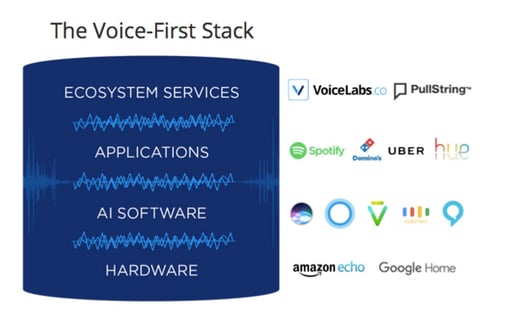State of Voice Platforms
Voicehacks Machinery.ai 17-08-25 Imran Haider 3 min read

Use of the word “platform” in the title is rather cautious. Because there is only one true platform in Voice and that's Amazon Alexa. While Google and Apple are in the game, you can't call their offerings platforms as yet. They have products and technologies in place but there ain't much for developers to do. Let's roll back a little bit and take a holistic view at the state of the industry. VoiceLabs recently released their 2017 VoiceReport. The report is worth a read in entirety. The picture below, however, is particularly important in understanding the different parts of a Voice stack.

At the bottom of the stack is hardware. In the case of Amazon, that's Echo with all of its different variants. So far they hold the majority of the market share. Google has Google Home and Apple recently announced HomePod.
Next is the AI software that does the actual voice recognition. This is Alexa, Google Assistant, and Siri for Amazon, Google, and Apple respectively.
On top of that, we have applications. Applications enable the use of AI software. These can be applications build by the company itself or they could be from third party developers. Amazon has the most number of third party developers. Google Assistant and Apple Siri have some interesting use cases. But most of them are pre-built into the AI software itself.
On top of all are the ecosystem players. These include companies working to enable and foster the entire ecosystem. For example, VoiceLabs provides analytics and insights. And Voicehacks is working on building communities focused on designing and building applications for the ecosystem.
For the purpose of clarity, we will focus only on three major players in the space, i.e., Amazon, Google, and Apple. Each of these three excel at one layer of the stack above. That strength is tightly coupled with the underlying business model of the respective company. It's important to understand this because knowing the strength of each will enable you design and develop relevant apps.
Apple's focus will always be on the hardware. Almost every capability they build in Siri will be to make their hardware devices work better. It's an important consideration because it means you will have to live inside Apple's ecosystem. Don't expect Siri to be functioning on a device without an Apple logo. There is a plus side to it. Apple thrives on integrated experiences so developing for Siri doesn't just mean developing for HomePod (fun fact: HomePod isn't there as yet). The efforts are portable to iPhone, iPad, Mac and, perhaps most importantly, AirPods.
Google is strong on AI software. Their aim is to have that software on as many devices as possible. While that means you have the choice in hardware but remember, Google Assistant will work best only when it has accompanying Google services aka Data. Because that's what gives the Assistant more leverage. For example, if you need directions, it's best to have Google Maps app. Of all three players, Google has the best underlying technology. When it comes to voice recognition and providing you best answers, no one can compete Google Assistant because it operates on best machine learning algorithms till date. However, they have the least chances of critical mass success. That's because Google Assistant doesn't have a direct access to the consumer. Most Android phones that matter are Samsung phones and Korean giant is building its own voice assistant. Google Home is everything but mainstream as yet.
Amazon has neither as good hardware as Apple. And not as good AI software as Google. But they are early movers and thus have the strongest ecosystem in place. In other words, they are good on the application layer. In the long run that might be a deciding factor especially when it comes to winning the home. Right now Amazon has the most market share as pointed above and is well positioned to establish an ecosystem where third party developers can equally be a part of. They have the only true voice platform as of now.
The big question however for everyone is the lack of the business model for third party developers. It's amazing how Alexa is growing even without that. The enthusiasm of developers and designers alike is what's feeding the platform right now. But like VoiceLabs pointed out, the problem is seemingly near to its resolution. And 2017 might be the year where a breakthrough in the business model for third party developers is likely to happen. Developers already in the ecosystem might be up for a great leg up.

Imran Haider
Imran is technology researcher and writer at Modev. He has a background in Product Marketing, Business Analysis and IT Product Management. Now a days if he is not writing, he is normally reading or listening to audio books on AI, Machine Learning, Blockchain and Robotics.